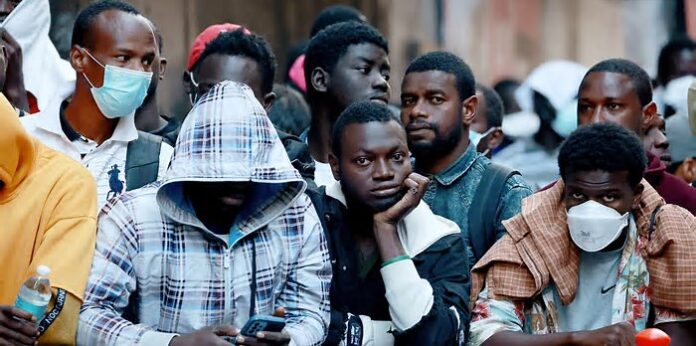Six months after he arrived in the U.S., Orlando fell terribly ill. The migrant from Venezuela said he couldn’t drink water, eat food or even swallow his own saliva.
Like thousands of other migrants, Orlando wound up in New York City’s public hospital system, where he was diagnosed with esophageal cancer and began chemotherapy and radiation treatments. He’s now able to eat and speak clearly, and he’s certain he wouldn’t still be alive had he decided to remain in Venezuela.
“The therapies, the chemo — all of that is out of control,” he said, referring to the exorbitant cost of medical care in his home country. “I would have passed away by now.”
Orlando, who asked to be identified by his first name because of safety concerns, is one of the more than 116,000 migrants who have arrived in New York since April 2022, placing an enormous strain on the city’s public hospital system.
In the past year alone, medical centers across the five boroughs have received nearly 30,000 visits from undocumented migrants seeking medical care, according to data from New York City Health + Hospitals, which operates the city’s public hospitals and clinics. About 300 new babies have been born to migrant moms during that period, most at Bellevue Hospital in Manhattan, which has seen one-quarter of the overall migrant visits.
“This has been the hardest work I’ve ever done,” said Dr. Ted Long, a senior vice president for New York City Health + Hospitals who helps oversee the city’s health response to the migrants.
“But it’s been the most impactful work that I’ve ever done,” added Long, who also holds a weekly clinic for patients in need of primary care.
Long said the level of trauma he has seen from some of his migrant patients, both physical and emotional, has been high.
“Every asylum-seeker who has been through trauma and sometimes literal hell to get here in New York City deserves a chance, deserves to have our help to take their next step forward,” he said.
Randye Retkin, the director of LegalHealth, a division of the New York Legal Assistance Group, runs a taxpayer-funded legal clinic at Bellevue Hospital where patients of all backgrounds are able to access legal services if they are referred by health care providers. Now, most of the clients she sees are migrants, some of whom are in need of lifesaving care.
Retkin said the clinic has been inundated with requests from migrants needing help not just with asylum applications and work authorization but even with organ transplants and cancer treatment.
“Of course, we want to make sure we get to those clients or patients as soon as possible,” Retkin said. “The health care professional will say, ‘This person might need a transplant in a month or so,’ or ‘This person really can’t get the treatment they need. Can you help us out?’”
For patients whose legal needs aren’t critical emergencies, including U.S. citizens who might be dealing with issues like addiction and eviction, the wait times can be months, or they can be referred to other service providers, she said.
“I’m sure if you talk to anybody else in the city who’s doing this work, there are waiting lists and people are turning people away or referring them to other places,” Retkin said. “If you asked me, ‘Do we need more resources for legal services?’ I would say absolutely, yes.”
“We don’t want to necessarily turn anybody away, but they do have to wait for an appointment,” she said.
Other social services in the city are also experiencing rises in demand from the migrant influx, including housing and nutrition programs.
A spokesperson for Public Health Solutions, which operates New York state’s largest program for Women, Infant and Children nutrition, said it has had a 30% increase in enrollment due to the large number of newly arrived migrants, with lines out the door on some days at its Queens location.
After he arrived in New York, Orlando relied on the New York Legal Assistance Group’s LegalHealth division to help him secure the paperwork he needed to get care and find temporary shelter.
But he has still had trouble getting work authorization or finding a place to sleep that will take both him and his brother.
When he sleeps on the street, Orlando said, he has to use his imagination.
“One asks God for strength first and foremost, and then you forget about everything,” he said. “You have to make believe it’s a good bed, a king-size, and you lie down wherever and go to sleep.”
Source: NBCNews.com

